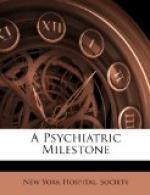Strange to say, good old Aristotle was nearer an understanding than most of the wise men and women that have succeeded him for these more than two thousand years. He saw in the psyche what he called the form and realization or fulfilment of the human organism; he would probably now say with us, the activity and function as an individual or person.
Through the disharmonies and inevitable disruption of a self-disorganizing civilization, the Greek and Roman world was plunged into the dark centuries during which the perils of the soul and the sacrificial attainment of salvation by monastic life and crusades threatened to overshadow all other concern. This had some inevitable results: it favored all those views through which the soul became like a special thing or substance, in contrast to and yet a counterpart of the physical body. As long as there was no objective experimental science, the culminating solution of life problems had to be intrusted to that remarkable development of religious philosophy which arose from the blending of Hebrew religion and tradition and the loftiest products of the Greek mind, in the form which St. Paul and the early Church fathers gave to the teachings of Christ. From being the form and activation, or function, of the organism in life, the soul feature of man was given an appearance in which it could neither be grasped nor understood, nor shaped, nor guided by man when it got into trouble. From the Middle Ages there arose an artificial soul and an artificial world of souls presented as being in eternal conflict with the evil of the flesh—and thus the house of human nature was divided against itself.
Science of the nineteenth century came nearer bringing mind and body together again. The new astronomical conception of the world and the growing objective experimental science gradually began to command confidence, and from being a destroyer of excessively dogmatic notions, science began to rise to its modern constructive and creative position. But the problem of mind remained on a wrong basis and still does so even with most scientists. Too much had been claimed for the psyche, and because of the singling out of a great world of spirit, the world of fact had been compromised and left cold and dry and unattractive and unpromising. No doubt it was necessary that the scientist should become hardened and weaned from all misleading expectation, and shy of all the spurious claims of sordid superstition and of childish fancy. He may have been unduly radical in cutting out everything that in any way recalled the misleading notions. In the end, we had to go through a stage of psychology without a “soul,” and lately even a psychology without “consciousness,” so that we might be safe from unscientific pretensions. All the gyrations no doubt tended to retard the wholesome practical attack upon the problems in the form in which we find them in our common-sense life.




